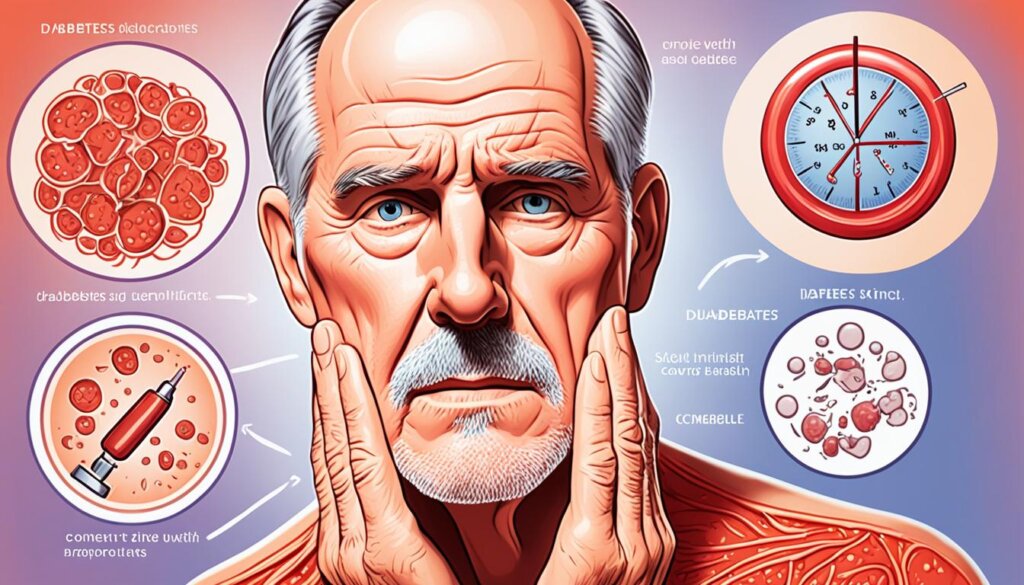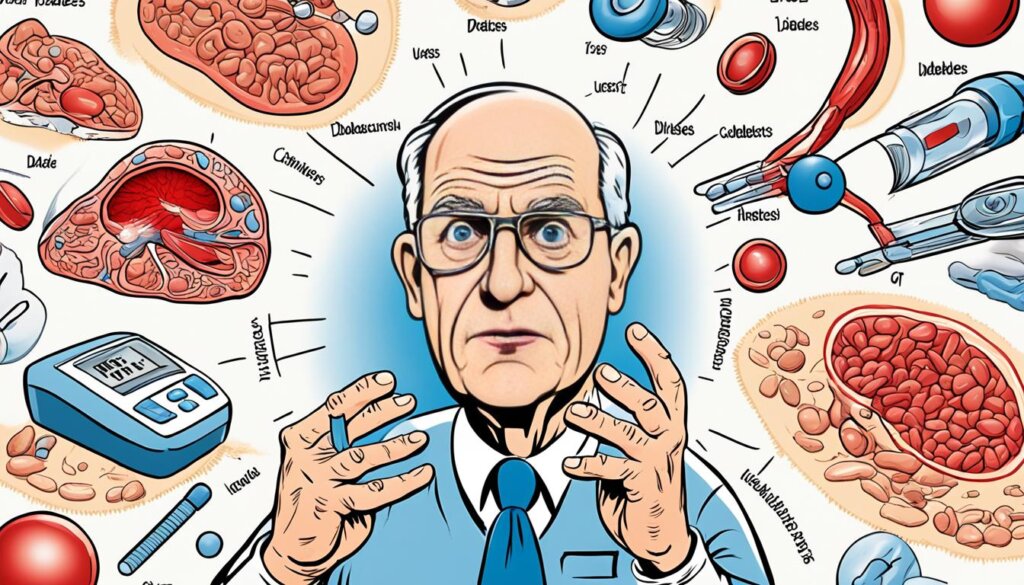FTC disclaimer: This post may contains affiliate links and we will be compensated if you click on a link and make a purchase.
In the U.S., about 97.6 million adults age 18-64 and 27.2 million adults age 65 or older have prediabetes. Many people with Type 1 and Type 2 diabetes don’t know they have it. Diabetes can cause serious health problems if not treated. These include nerve damage, kidney damage, eye damage, foot problems, skin and mouth issues, osteoporosis, and higher risk of Alzheimer’s disease and depression.
It’s important to know about these diabetes complications and risk factors. This knowledge helps with managing and preventing diabetes.
Key Takeaways
- Diabetes can lead to serious health issues like nerve damage, kidney damage, eye damage, and foot problems.
- Being overweight or obese, older age and certain ethnicities raise the risk of diabetes and its complications.
- High blood sugar levels and diabetes duration increase the risk of serious complications.
- Gestational diabetes affects both the mother and the baby, leading to bigger babies and a higher risk of obesity and type 2 diabetes later.
- Managing diabetes with lifestyle changes and medication, along with regular check-ups and specialized care, can prevent or delay complications.
Understanding Diabetes
Diabetes mellitus is a chronic condition that affects how your body handles blood sugar (glucose). It can cause too much sugar in the blood, leading to serious health issues if not managed. There are different types of diabetes, like type 1, type 2, prediabetes, and gestational diabetes, each with its own causes and effects.
What is Diabetes?
Diabetes is a disease where your body can’t make enough insulin or can’t use it well. This leads to high blood sugar levels. High blood sugar can harm your organs and systems over time.
Types of Diabetes
- Type 1 Diabetes: This happens when your immune system attacks the cells that make insulin in the pancreas. You can’t make insulin then. It usually starts in kids or teens.
- Type 2 Diabetes: This is the most common diabetes type. Your body doesn’t respond well to insulin or doesn’t make enough of it. It’s often linked to being overweight, not moving much, and eating poorly.
- Prediabetes: This means your blood sugar is higher than it should be but not high enough for a diabetes diagnosis. It raises your risk of getting type 2 diabetes. But, you can lower this risk by changing your lifestyle.
- Gestational Diabetes: This type of diabetes happens during pregnancy and usually goes away after the baby is born. But, it can raise the risk of getting type 2 diabetes later for both mom and baby.
Knowing about the different diabetes types and how they start is key to managing them. Regular check-ups, watching your blood sugar, and changing your lifestyle can help prevent or manage diabetes and its problems.
“Diabetes is a chronic condition that requires ongoing management, but with the right approach, individuals with diabetes can live long, healthy lives.” – American Diabetes Association
Diabetes Complications
Diabetes is a chronic condition that can lead to serious complications if not managed well. These include nerve damage (diabetic neuropathy), kidney damage (diabetic nephropathy), and eye damage (diabetic retinopathy).
Nerve Damage (Diabetic Neuropathy)
About 70% of people with diabetes for many years suffer from nerve damage. This can cause numbness, tingling, pain, and other issues in the hands and feet. It can also affect digestion, sexual function, and more.
Kidney Damage (Diabetic Nephropathy)
Diabetes is a top cause of kidney disease. Many people with diabetes get high blood pressure, which can harm the kidneys. If diabetes is not controlled, it may lead to dialysis or a kidney transplant.
Eye Damage (Diabetic Retinopathy)
Diabetic retinopathy can cause blindness. Over 80% of people with diabetes for over 20 years get this condition. Glaucoma, cataracts, and other vision problems are also common.
Managing blood sugar levels is key to preventing or slowing these serious complications. Regular check-ups, taking your medicine, and living a healthy life can lower the risk and impact of these conditions.
Diabetes can also cause heart disease, stroke, foot problems, skin issues, and more. Managing diabetes well is crucial to reduce the risk of these serious health problems.
“Diabetes is a formidable foe, but with vigilance and the right approach, we can overcome its challenges and protect our health.” – Dr. Emily Garner, Endocrinologist
Foot Complications
Diabetes can really hurt your foot health, making many complications more likely. Foot issues are common in people with diabetes. This is because the disease can damage nerves, leading to losing feeling in the feet.
Also, diabetes can make blood flow to the feet poor, making sores or infections hard to heal. This nerve and blood vessel damage can cause serious problems like gangrene and foot ulcers that won’t heal, leading to amputations.
Diabetes can also change the shape of your foot, like Charcot’s foot, where the bones weaken and change shape. To prevent and manage foot problems, Medicare Part B and other health plans might cover special shoes or inserts.
Walking, swimming, or biking can also help improve blood flow to your feet. And, quitting smoking is key because it can reduce blood flow to your feet.
About 10% of people with diabetes will get foot ulcers, often from small cuts, slow-healing wounds, or bad shoes. Always wear closed-toed shoes or slippers to protect your feet, and make sure your socks or stockings fit well.
Seeing a podiatrist every 2 to 3 months can help spot and fix problems early. If you see changes in skin color, temperature, swelling, or other foot issues, get medical help right away.
More than half of all amputations are in people with diabetes, often from infected foot ulcers. In the UK and the US, diabetes is a big reason for major amputations. Foot ulcers happen in about 2% of people with diabetes each year, but rates can be higher in some groups.
Studies suggest up to 34% of people with diabetes might get a foot ulcer at some point. Half of these ulcers can come back, showing the importance of ongoing care.
Things like nerve damage, poor blood flow, and foot shape changes increase the risk of foot ulcers and amputations in diabetes. Men in Western countries face a higher risk of foot ulcers, and some ethnic groups in the US have higher rates too.
Things like nerve damage, foot shape issues, injuries, and bad shoes can make ulcers more likely. It’s important to check your health regularly to spot risks and take steps to prevent foot problems.
Skin and Mouth Conditions
Diabetes can make you more likely to get skin and mouth problems. This includes infections and gum disease. It’s key to keep your mouth and skin clean and get help fast if you have any issues.
Diabetes can cause skin issues like diabetic dermopathy, or “shin spots.” These usually go away when diabetes is under control. Acanthosis nigricans is another issue, showing up as dark skin patches. It might be a sign of diabetes before it’s diagnosed. Scleredema diabeticorum makes skin thick and hard, often on the upper back or neck.
Poor blood flow and nerve damage from diabetes can lead to diabetic ulcers on the feet, especially if blood sugar is high. High diabetes levels can also cause eruptive xanthomatosis and xanthelasma, which are bumps and yellow patches around the eyes.
Diabetes weakens the immune system, making you more likely to get infections. This includes oral thrush and yeast infections in the mouth and vagina. Skin tags in large numbers, like on the eyelids or neck, could mean you have type 2 diabetes.
People with diabetes often get gum disease and cavities. They might also have dry mouth, thrush, and changes in taste. This is because diabetes changes saliva and raises sugar levels, making teeth more prone to problems.
About 25% of U.S. adults with diabetes over 50 have lost most of their teeth, compared to 16% without diabetes. Diabetes raises the risk of gum disease and other mouth issues.
Diabetes-related skin and mouth problems can be serious. They need care from a skin or mouth specialist. Keeping your skin and mouth clean and getting treatment quickly is crucial for people with diabetes.

Osteoporosis Risk
People with type 1 diabetes are more likely to get osteoporosis. This makes their bones weak and more likely to break. Studies say that 26% to 52% of adults with type 1 diabetes might have osteoporosis. Young women with type 1 diabetes are especially at risk because they often have lower bone density that doesn’t get better.
Type 2 diabetes also makes bones weaker and more prone to breaking. Diabetes is linked to a higher chance of major bone fractures. Children with type 1 diabetes have a changed bone process that can lead to osteoporosis.
Keeping bones strong is key for people with diabetes. This can be done with exercises that make you stand up, eating foods full of calcium and vitamin D, and maybe taking medicine. By doing these things, people with diabetes can lower their chance of getting osteoporosis and breaking bones. This makes their life better overall.
Diabetes Complications and Alzheimer’s Disease
Research shows a link between poor blood sugar control and Alzheimer’s disease and dementia. The brain may not get the fuel it needs with diabetes, causing damage and cognitive issues.
People with type 1 diabetes face a 93% higher risk of dementia. Those with type 1 diabetes and extreme blood sugar levels are six times more likely to get dementia.
Type 2 diabetes is also linked to Alzheimer’s disease. High blood sugar in type 2 diabetes increases beta-amyloid protein, a key Alzheimer’s marker. Early type 2 diabetes can cause brain problems, like insulin resistance and trouble using glucose.
Type 2 diabetes speeds up cognitive decline, especially in executive function and processing speed. Diabetes early effects on the brain are tied to hemoglobin A1C levels, affecting memory and hippocampal size. Diabetics often have smaller hippocampal sizes, linked to HbA1C levels.
Lifestyle changes can lower diabetes and dementia risk, as advised by the American Heart Association. These include managing blood pressure, controlling cholesterol, reducing blood sugar, staying active, eating right, losing weight, and quitting smoking.
“The relationship between diabetes and Alzheimer’s disease is complex, but the evidence suggests that maintaining healthy blood sugar levels can play a crucial role in preserving cognitive function as we age.”

Metabolic syndrome, with its high blood sugar, high blood pressure, and obesity, is linked to cognitive decline in older people. High glycosylated hemoglobin levels are tied to mild cognitive impairment or dementia in older women.
Good blood sugar control and managing metabolic factors are key to keeping the brain healthy and lowering Alzheimer’s and dementia risk. By making lifestyle changes and working with healthcare providers, people with diabetes can protect their cognitive function and live a healthier life.
Depression and Diabetes
Diabetes is a complex condition that affects mental health. People with diabetes, type 1 or type 2, often face depression. In fact, 40% of those diagnosed with diabetes struggle with their mental health. They are also twice as likely to have depression than those without diabetes.
The link between diabetes and depression is complex. Studies show that depression can lead to type 2 diabetes. There are seven genetic changes found that connect depression and diabetes.
Depression can make managing diabetes harder. It affects how well people follow their treatment plans. It can also change how they check their blood sugar and keep doctor’s appointments. Some antidepressants might also change weight or blood sugar levels, so diabetes treatments might need to be adjusted.
It’s key to treat depression in diabetes care. Cognitive Behavioral Therapy (CBT) helps with stress and mood. Most people can get free CBT, which helps with both diabetes and depression. Exercise also helps with weight, blood sugar, and mood, which is good for diabetes.
Helping people with diabetes with their mental health improves their overall well-being and diabetes care. A team of healthcare providers working together can help those with depression and diabetes get better results.
Gestational Diabetes Complications
Gestational diabetes is a type of diabetes that happens during pregnancy. It can cause problems for both the baby and the mom. It’s important for expecting parents to know about these issues to help their babies and themselves.
Complications for the Baby
Babies of moms with gestational diabetes might grow too big. This can make birth harder. They could also have low blood sugar right after birth, known as neonatal hypoglycemia. High blood sugar can also lead to induced labor and a higher chance of a C-section.
These babies might face a higher risk of being overweight or getting type 2 diabetes later. In rare cases, they could face serious risks during birth if gestational diabetes is not treated. Kids of moms with gestational diabetes are more likely to get type 2 diabetes or be overweight later on.
Complications for the Mother
Women with gestational diabetes are at a higher risk of preeclampsia, a serious condition with high blood pressure and possible organ damage. They also face a greater chance of getting type 2 diabetes later. If the baby is too big or the blood pressure is high, they might have to deliver early.
Expectant moms with gestational diabetes need to keep a close eye on their health. Working with their healthcare team is key to managing any issues and ensuring the best outcomes for both mom and baby.
Complications for the Baby | Complications for the Mother |
|---|---|
|
|
“Gestational diabetes can have serious consequences for both the mother and her baby if not properly managed. It’s crucial for expectant mothers to work closely with their healthcare providers to monitor and control their blood sugar levels throughout the pregnancy.”
Diabetes Risk Factors
Knowing what can make you more likely to get diabetes is key. Some things you can’t change, like your family history and age. But, you can change others by making lifestyle changes.
Non-Modifiable Risk Factors
Some things make you more likely to get diabetes and you can’t change them. These include:
- Family history: If someone close to you has diabetes, you’re more at risk.
- Race or ethnicity: Some groups, like Black Americans and others, are more likely to get diabetes.
- Age: Getting older makes you more likely to get diabetes, especially after 45.
- Previous gestational diabetes: If you had diabetes while pregnant, you’re more likely to get type 2 diabetes later.
Modifiable Risk Factors
There are also things you can change to lower your diabetes risk:
- Being overweight or obese: Losing 5% to 10% of your weight can really help.
- Physical inactivity: Being active can make your body less resistant to insulin, lowering your diabetes risk.
- High blood pressure: Keeping your blood pressure below 130/80 mm Hg is key to avoiding diabetes problems.
- Smoking: Quitting smoking can lower your diabetes risk.
By knowing and working on these risk factors, you can lower your chance of getting diabetes and its problems.
Diabetes Complications
Diabetes is a chronic condition that can lead to serious health problems if not managed well. It can cause heart disease, stroke, atherosclerosis, peripheral artery disease, and chronic kidney disease. These issues can be very serious and even deadly. That’s why managing diabetes well is so important.
People with diabetes are at a higher risk of heart disease and stroke than those without it. Atherosclerosis, or plaque buildup in arteries, can cause more heart problems. This can also lead to peripheral artery disease, which limits blood flow to the hands and feet.
Chronic kidney disease is a big concern for diabetics, affecting about 1 in 3 adults with the condition. Damage to blood vessels and nerves from diabetes can cause infections. Sometimes, these infections may need amputations.
But, many of these problems can be prevented or delayed. A healthy lifestyle helps, including eating right, staying active, and managing blood pressure, cholesterol, and weight. Taking your medicines as directed is also key to lowering the risk of these complications.

Understanding the risks of diabetes complications and acting early can make a big difference. By staying informed and working with your healthcare team, you can manage your diabetes better. This helps you live a healthier life.
Preventing Diabetes Complications
Many diabetes-related problems can be stopped or slowed down. This is done by managing the condition well. You can do this by living a healthy lifestyle. This means eating right, staying active, and keeping a healthy weight. Working with your doctor to keep your blood sugar and blood pressure in check is also key. Sometimes, you might need medicine to help control diabetes and lower risks.
Lifestyle Changes
Changing your lifestyle can really help prevent diabetes problems. Here are some ways to do it:
- Eat a balanced diet and exercise regularly to keep a healthy weight.
- Lower your salt intake, especially if you have high blood pressure or diabetes.
- Stop smoking to avoid early death and other health issues.
- Add “superfoods” like berries and leafy greens to your meals, but eat less saturated and trans fats.
- Do at least 30 minutes of exercise each day to lower heart risks and improve your health.
Medication Options
Along with lifestyle changes, you might need medicine to manage diabetes and prevent problems. This could mean:
- Taking low-dose aspirin daily if you have diabetes and heart disease.
- Using medicines to control your blood sugar, blood pressure, and cholesterol.
It’s important to have regular check-ups and screenings to catch and prevent diabetes complications. This includes:
- Eye exams to find and treat diabetic retinopathy and eye issues.
- Foot exams to spot and fix nerve damage or foot problems.
- Checking your A1C, blood pressure, and cholesterol to lower heart disease risks.
- Going to the doctor two to four times a year, or more if needed, to keep your blood sugar stable.
By taking steps now and working with your healthcare team, you can prevent diabetes complications and stay healthy.
Managing Diabetes
Managing diabetes well is key to stop or slow down complications. It means working with a healthcare team to check blood sugar, take medicines, and change your lifestyle for better health. By being active in your care, you can live better and lower the risk of serious problems.
Keeping your blood sugar in check is a big part of managing diabetes. The American Diabetes Association says to aim for an A1C below 7% for most people with diabetes. Also, keeping your blood pressure and cholesterol right is key to avoiding heart problems.
Changing your lifestyle helps a lot with diabetes care. Try to do at least 150 minutes of moderate exercise each week to help with blood sugar, blood pressure, and cholesterol. Also, keep a healthy weight, sleep well, and manage stress to help manage diabetes.
Managing your medicines is also important for diabetes care. Your doctor might give you insulin, metformin, or other pills to control your blood sugar. You might need to change your medicine plan to keep your diabetes under control.
Working with your healthcare team and caring for your diabetes can make a big difference. This can help you live a better life and lower the risk of serious issues.

Diabetes Management Strategies | Key Recommendations |
|---|---|
Blood Sugar Control |
|
Blood Pressure Management |
|
Cholesterol Management |
|
Lifestyle Modifications |
|
Medication Management |
|
“Effective diabetes management involves a comprehensive approach that includes monitoring blood sugar levels, taking medications as prescribed, and making lifestyle changes to support overall health and well-being.”
Using these strategies for managing diabetes can help you take charge of your health and lower the risk of complications. Working with your healthcare team and caring for yourself are key to managing diabetes well and improving your health over time.
Conclusion
Diabetes is a complex condition that can lead to serious health problems if not managed. In 2021, over 400 million adults had diabetes, and most had type 2 diabetes. People with diabetes are at higher risk for nerve damage, kidney disease, heart disease, and blindness. Keeping an eye on blood sugar levels is key to preventing these issues.
The number of people with diabetes is growing worldwide. This rise is causing a lot of health problems, making life harder for those with diabetes. These problems can be small like nerve damage or big like heart disease. Knowing the risks and how to prevent them is important for managing diabetes well.
Working with doctors, living a healthy life, and watching blood sugar levels can lower the risk of serious problems. With the right steps, people with diabetes can manage their health and live well despite the challenges.
FAQ
What are the potential complications of diabetes?
Diabetes can cause serious health issues if not treated. These include nerve damage, kidney damage, eye problems, foot issues, skin and mouth conditions, osteoporosis, and a higher risk of Alzheimer’s and depression.
What are the different types of diabetes?
Diabetes is a group of diseases that affect blood sugar use. The main types are type 1, type 2, prediabetes, and gestational diabetes.
How can diabetes lead to nerve damage?
Nerve damage from diabetes causes numbness, tingling, and pain. It also affects digestion, sexual function, and more. Keeping blood sugar levels under control is key to preventing this.
What are the effects of diabetes on the kidneys?
Diabetes can damage kidneys, leading to dialysis or a transplant. Keeping blood sugar in check helps prevent or slow this damage.
How does diabetes affect the eyes?
Diabetes can harm the eyes, causing glaucoma, cataracts, and blindness. Regular eye checks and managing blood sugar are crucial to prevent this.
What are the foot complications associated with diabetes?
Diabetes increases the risk of foot problems like ulcers and infections. It can even lead to amputation. Good foot care and regular doctor visits are key for diabetics.
Can diabetes affect skin and oral health?
Yes, diabetes raises the risk of skin and mouth issues. These include infections and gum disease. Good oral hygiene and quick treatment for issues are important for diabetics.
How does diabetes impact bone health?
Type 1 diabetes can lead to osteoporosis, making bones weak and prone to fractures. Strong bones are crucial for diabetics through exercise, diet, and possibly medication.
Is there a link between diabetes and Alzheimer’s disease?
Research shows poor blood sugar control may increase Alzheimer’s risk. The exact link is still being studied, but diabetes might harm the brain’s fuel supply, causing damage and cognitive issues.
Can diabetes lead to mental health issues?
Yes, diabetes often causes depression. Managing the condition and its physical effects can affect mental health. Addressing depression is vital in diabetes care.
What are the potential complications of gestational diabetes?
Gestational diabetes can harm both the baby and the mother. Babies may grow too big, have low blood sugar, and face obesity and type 2 diabetes risks later. Mothers are at higher risk of preeclampsia and type 2 diabetes later.
What are the risk factors for developing diabetes?
Some diabetes risks can’t be changed, like family history or race. But, you can change others, like being overweight or inactive. Lowering these risks can reduce diabetes and its complications.
How can diabetes lead to cardiovascular and other serious complications?
Diabetes can cause serious issues like heart disease, stroke, and kidney disease. These problems can be severe and life-threatening. Managing diabetes well is crucial to prevent these complications.
How can I prevent or delay the onset of diabetes complications?
Many diabetes complications can be prevented or delayed with good management. This means living a healthy life, controlling blood sugar, and working with a healthcare provider. Sometimes, medication is also needed.
How can I effectively manage my diabetes to prevent complications?
Managing diabetes well is key to preventing complications. This means working with a healthcare team, monitoring blood sugar, and making healthy lifestyle changes. Taking an active role in your care can greatly improve your health and reduce complication risks.








